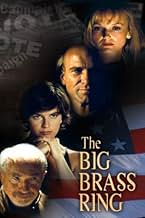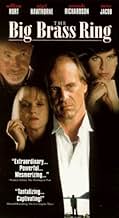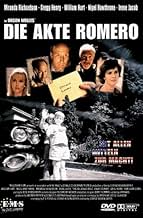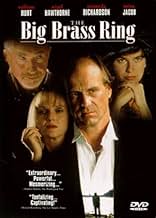Füge eine Handlung in deiner Sprache hinzuBlake Pellarin is on the campaign trail to become Governor of the state of Missouri. During his stop in St. Louis, a chance encounter brings his past roaring back to haunt him. Will the trut... Alles lesenBlake Pellarin is on the campaign trail to become Governor of the state of Missouri. During his stop in St. Louis, a chance encounter brings his past roaring back to haunt him. Will the truth ruin his chances to be elected, or will he land the "Big Brass Ring"?Blake Pellarin is on the campaign trail to become Governor of the state of Missouri. During his stop in St. Louis, a chance encounter brings his past roaring back to haunt him. Will the truth ruin his chances to be elected, or will he land the "Big Brass Ring"?
- Auszeichnungen
- 1 Gewinn & 3 Nominierungen insgesamt
- Cela
- (as Irene Jacob)
- Gigi Moorehead
- (as Peggy Friesen)
Empfohlene Bewertungen
On the surface it is a very free adaptation. Underneath, it is highly faithful... Welles's original script was set in Spain and the Congo. We set ours along the Mississipi and in Cuba. Nevertheless, the characters have kept their original names and essential personalities through the many adaptations George and I devised (whether separately or together) between 1991 and '98.
Welles's tale centered on a Presidential hopeful who escapes his wealthy wife's yacht and pursues a clandestine adventure with his aged political mentor (a part Welles wrote for himself). This grand sage, a fallen Lucifer of American politics, was a candidate for President in his own prime -- until he was outed as a homosexual. In Welles's original, the two old friends engage in a psychological chess match involving a long-vanished woman they both know. In ours, they play an equally rough game over a long-lost brother.
(Welles himself had a troubled brother, Richard, who shadowed him throughout his life. THAT felt like a deeper wound to explore in Welles's wake than the ghost of a missing mistress.)
In both versions, the reunion between the hero and his old mentor sparks a dark merry go round of busy pursuits. An ambitious reporter modeled on Italy's Oriana Fallaci chases Blake and flirts with him, and tries to penetrate the secret of his soul, particularly his connection to the old man. The candidate's wife (jealous of the mentor) schemes and looses a murderous espionage agent on the old man's tail.
Details vary, sometimes wildly, between what Welles conceived and what we executed. My wish in retrospect is that we had played certain cards face up in terms of story secrets. (I won't say which ones here -- no spoilers!) More and more, I'm convinced that Hitchcock was right to keep as few secrets as possible from HIS audience. Less confusing AND more suspenseful!
Were we wrong to take liberties? No. A film must be a living thing. As Welles always advised young filmmakers, "Be Bold!" He is after all the guy who conflated five Shakespeare plays into a single new one centered on the character Falstaff -- CHIMES AT MIDNIGHT.
I'm giving this movie only a "7 out of 10" out of respect to everyone who adds posts to this board yet is NOT one of the filmmakers. (I'm too close to be objective: My heart says, "Give it a ten." Flaws and all, I'm very proud of it.)
I can offer one bit of impartial praise: William Hurt, Nigel Hawthorne, Miranda Richardson, Irene Jacob, Jeff Mayes and Ewan Stewart all give superb, multi layered performances. Welles could have asked for no better group to embody the characters he originated.
The movie was interesting but confusing. I like a little mystery in my movies, but it was tough to keep all the balding white guys with multiple names straight -- especially in the flashbacks.
However, CNN correspondent Christiane Amanpour (Irène Jacob) never looked so good.
The biggest problem I had was character development. By the end of the film one should reasonably expect the pieces to fit together. Good character development should give us insight into the characters' motivation. I found this lacking. The flashbacks didn't really help us to understand the motivations of the characters as much as they should have. It seems that the brothers voluntarily switched identities, since Billy was wearing a name tag that said "Romero" on his uniform when he left to go to war. So, Blake really didn't steal his brother's identity as it appeared. This wasn't made very clear.
There were lots of loose ends here. What motivated the limo driver to do what he did? Was it a need to be close to power, or some personal vendetta? Who knows?
From a directorial and cinematography point of view, the film was far too dark, that is, underexposed. I'm certain they were trying for that look, but it made the photography look as if it were shot on 30 year old film of poor quality. Also, the audio was very bad. It was very difficult understanding a lot of the dialogue.
William Hurt was miscast in this role. For certain films, his puling, self tortured style of delivery are appropriate to the character (Big Chill, Broadcast News, Children of a Lesser God). However, in this film his character required a more dynamic and confident portrayal, which he was unable to deliver.
Nigel Hawthorne gave the best performance as Kim Mennaker, the Senator who brought the boys up. His ability to portray the old political warhorse, seduced by the trappings of power was excellent.
Irene Jacob gave a good performance as Cela, the reporter with an obsession for the candidate and the truth behind him.
Overall, the whole was less than the sum of the parts. The presentation was ponderous and uneven and the direction mediocre at best. Worth a 5/10. If you are looking for political campaign stories, there are better choices (Primary Colors, The Candidate, with Robert Redford).
Wusstest du schon
- WissenswertesThe "big brass ring" of the title is a reference to the high brass rings found in old fashioned gyms and swimming pools, which one was supposed to jump up to and grab. It is a metaphor for that which is difficult to attain, or at least hard to hold fast and retain.
- PatzerIn the scene just after Blake (Hurt) and Brandini (Jacob) make love, she is still in bed and trying to encourage Blake to go public with the truth. She suggests that she might expose him if he doesn't. Blake yanks off the bedcovers, exposing her completely-naked body. But in the next-second close-up, something covers her from the waist down.
- VerbindungenReferences Citizen Kane (1941)
- SoundtracksMortal Thoughts
Written and Performed by Scott Nickoley (ASCAP) and Jamie Dunlap (as Jaime Dunlap) (BMI)
Published by Red Engine Music (ASCAP), Revision West (BMI), Brunello Music (ASCAP), JDSoul Music (BMI)
Courtesy of Mark Ferrari/Mastersource
Top-Auswahl
Details
- Erscheinungsdatum
- Herkunftsland
- Sprachen
- Auch bekannt als
- Die Macht der Lüge
- Drehorte
- Produktionsfirmen
- Weitere beteiligte Unternehmen bei IMDbPro anzeigen
Box Office
- Budget
- 7.000.000 $ (geschätzt)
- Laufzeit
- 1 Std. 44 Min.(104 min)
- Farbe
- Sound-Mix
- Seitenverhältnis
- 1.33 : 1

































